Related Research Articles

Harold Edward Holt was an Australian politician who served as the 17th prime minister of Australia from 1966 until his presumed death in 1967. He held office as leader of the Liberal Party.

The Liberal Party of Australia is a major centre-right political party in Australia, one of the two major parties in Australian politics, along with the centre-left Australian Labor Party. It was founded in 1944 as the successor to the United Australia Party.
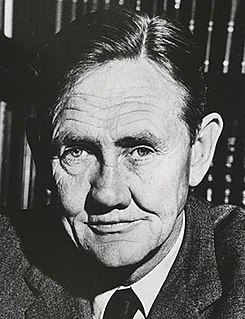
Sir John Grey Gorton was the nineteenth Prime Minister of Australia, in office from 1968 to 1971. He led the Liberal Party during that time, having previously been a long-serving government minister.
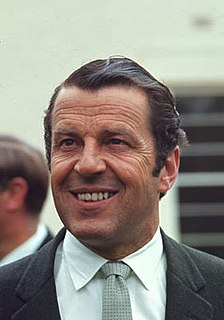
Donald Leslie Chipp, AO was an Australian politician who was the inaugural leader of the Australian Democrats, leading the party from 1977 to 1986. He began his career as a member of the Liberal Party, winning election to the House of Representatives in 1960 and serving as a government minister for a cumulative total of six years. Chipp left the Liberals in 1977 and was soon persuaded to lead a new party, the Democrats who, he famously proclaimed in 1980, would "keep the bastards honest". He was elected to the Senate on 10 December 1977 and led the party at four federal elections. From 1983 it held the sole balance of power in the Senate.

William Charles Wentworth, usually known as Bill Wentworth and sometimes referred to by others as William Charles Wentworth IV, was an Australian politician. He was a member of the Liberal Party for most of his career and held ministerial office in the governments of John Gorton and William McMahon, serving as Minister for Social Services (1968–1972) and Minister in charge of Aboriginal Affairs (1968–1971). Wentworth served in the House of Representatives from 1949 to 1977, representing the New South Wales seat of Mackellar. He frequently crossed the floor and served his final months in parliament as an independent.
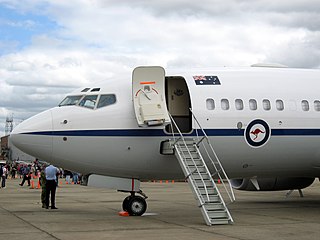
The Royal Australian Air Force operates a number of specialised aircraft to transport the Queen of Australia and other members of the Royal Family, the Governor General of Australia, the Prime Minister of Australia, senior members of the Australian government and other dignitaries.

Leslie Harry Ernest Bury CMG was an Australian politician and economist. He was a member of the Liberal Party and served in the House of Representatives between 1956 and 1974, representing the Division of Wentworth. He held ministerial office in Coalition governments for nearly a decade, serving as Minister for Air (1961–1962), Housing (1963–1966), Labour and National Service (1966–1969), Treasurer (1969–1971) and Foreign Affairs (1971).

Sir David Eric Fairbairn, was an Australian politician. He was a member of the Liberal Party and served in the House of Representatives from 1949 to 1975. He held ministerial office as Minister for Air (1962–1964), National Development (1964–1969), Education and Science (1971), and Defence (1971–1972).

Peter Howson CMG was an Australian politician who served in the House of Representatives from 1955 to 1972, representing the Liberal Party. He was Minister for Air from 1964 to 1968 and Minister for the Environment, Aborigines and the Arts from 1971 to 1972.
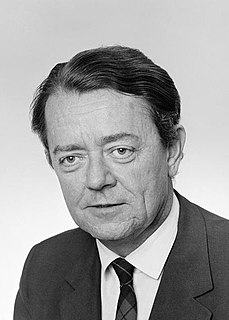
John Murray Wheeldon was an Australian politician and journalist. He was a member of the Australian Labor Party (ALP) and served as a Senator for Western Australia from 1965 to 1981. He held ministerial office in the Whitlam Government as Minister for Repatriation and Compensation (1974–1975) and Minister for Social Security (1975). He was known for his views on Australian foreign policy and after leaving politics became an editorial writer for The Australian.

Gerald Colin McKellar was an Australian politician. He was a member of the Country Party and served as a Senator for New South Wales from 1958 until his death in 1970. He was Minister for Repatriation from 1964 to 1969.
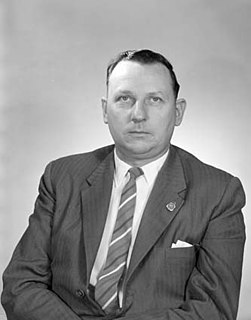
George Dudley Erwin was an Australian politician who served in the House of Representatives from 1955 to 1975, representing the Liberal Party. He was Chief Government Whip from 1967 to 1969, and played a role in the ascension of John Gorton to the prime ministership after the disappearance of Harold Holt. He was briefly Minister for Air in 1969, but a falling out with Gorton ended his ministerial career.
This is a list of members of the Australian Senate from 1965 to 1968. Half of its members were elected at the 9 December 1961 election and had terms starting on 1 July 1962 and finishing on 30 June 1968; the other half were elected at the 5 December 1964 half Senate election and had terms starting on 1 July 1965 and finishing on 30 June 1971. The process for filling casual vacancies was complex. While senators were elected for a six-year term, people appointed to a casual vacancy only held office until the earlier of the next election for the House of Representatives or the Senate.

The Gorton Government was the federal executive government of Australia led by Prime Minister John Gorton. It was made up of members of a Liberal-Country Party coalition in the Australian Parliament from January 1968 to March 1971.

The Holt Government was the federal executive government of Australia led by Prime Minister Harold Holt. It was made up of members of a Liberal-Country Party coalition in the Australian Parliament from 26 January 1966 – 19 December 1967.

The McMahon Government was the period of federal executive government of Australia led by Prime Minister William McMahon of the Liberal Party. It was made up of members of a coalition between the Liberal Party and the Country Party, led by Doug Anthony as Deputy Prime Minister. The McMahon Government lasted from March 1971 to December 1972, being defeated at the 1972 federal election. Writing for the Australian Dictionary of Biography, Julian Leeser describes McMahon's prime ministership as "a blend of cautious innovation and fundamental orthodoxy".

Sir Cyrus Lenox Simson Hewitt was an Australian public servant. His career in the Commonwealth Public Service spanned from 1939 to 1980, and included periods as a senior adviser and departmental secretary. His most prominent position was as secretary of the Prime Minister's Department during the Gorton Government (1968–1971). He worked closely with Prime Minister John Gorton, although his initial appointment in place of John Bunting was seen as unconventional. Hewitt was also influential as secretary of the Department of Minerals and Energy during the Whitlam Government (1972–1975), working under minister Rex Connor. He later served as chairman of Qantas (1975–1980).

The Leader of the Government in the Senate is the government's most senior cabinet minister in the Australian Senate and the main government spokesperson in the Senate. His or her Opposition counterpart is the Leader of the Opposition in the Senate.

A leadership election in the Liberal Party of Australia, the party of government in the Parliament of Australia, was held on 9 January 1968. It followed the disappearance and presumed drowning of previous leader Harold Holt, who had been declared dead on 19 December 1967. The contest was won by Senator John Gorton in a party room ballot; he was sworn in as prime minister the following day, replacing caretaker John McEwen.

Group Captain Archibald Bertram "Tich" McFarlane CBE DFC was an Australian public servant and Royal Australian Air Force (RAAF) officer. He commanded No. 2 Squadron RAAF during part of World War II. He later served as secretary of the Department of Air from 1956 to 1968 and held other senior positions in the Commonwealth Public Service and statutory bodies.
References
- ↑ Hancock 2003, p. 1.
- 1 2 Hancock 2003, p. 2.
- ↑ Farquharson, John (2001). "McFarlane, Archibald Bertram (Tich) (1916–2001)". Obituaries Australia. Retrieved 10 October 2020.
- ↑ Costello, Peter (8 February 2009). "Life dedicated to service on several fronts". The Sydney Morning Herald. Retrieved 10 October 2020.
- ↑ Hancock 2003, p. 3.